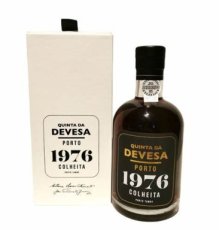Quinta da Devesa 1976 Colheita Port
The Quinta da Devesa Colheita 1976 Tawny is orange-brown in coloir with a slight verdant edge. Orange peel and smoky caramel notes on the nose. Maple and orange notes, spice on the palate. Full bodied and in perfect balance this is a delightful, yet a powerful and lively wine. A sumptuous finish with layers of complexity.
Food pairing
Delicious with cheese cake, pecan pie, pavlova, bread pudding, chocolate mousse.
Grapes: Old Vines with more than 20 traditional grape varieties of the region
Hand picked. Fermentation happens in Granite ‘lagares' (shallow treading tanks) with foot treading
Quinta da Devesa was already included in the first map of the Douro Demarcated Region, created by Baron of Forrester in 1844.
Acquired by Fortunato family in 1941, it has been since then dedicated to Douro and Port Wines. On the Baixo Corgo sub-region, and only 10 kms away from Peso da Régua, Quinta da Devesa vineyard and winery are located on a promontory which overlooks the confluence of the rivers Douro and Corgo, from where a wonderful sight can be enjoyed, covering the valleys of the rivers and mountains of the region.
Its 34 hectares, planted with the grape varieties recommended for the region, go from a quota of 60 m up to 500 m high, part facing south getting an excellent sun exposure, and part facing the buttresses of Marão, where it receives natural cool winds. This diversity of solar and wind exposure provides different levels of grape maturation and development, which allow to temporize harvesting in optimal conditions.
Alcoholcontent
21% vol
pH: 3,73
Store & Serve
Colheita Port should be stored in a cool and dry place, sheltered from light and temperature fluctuations, and the bottle should remain in an upright position. If stored correctly, Colheita Ports will keep for decades in the bottle. Over time, it is natural that a little sediment will form at the bottom of a bottle of colheita Port wine. Once opened colheita Port should be stored in a fridge and should be consumed within 4 to 6 months. Colheita Ports do not require decanting and are best served at a temperature between 14 and 16°C.
Critics & Awards
Tags: Quinta da Devesa - Douro


